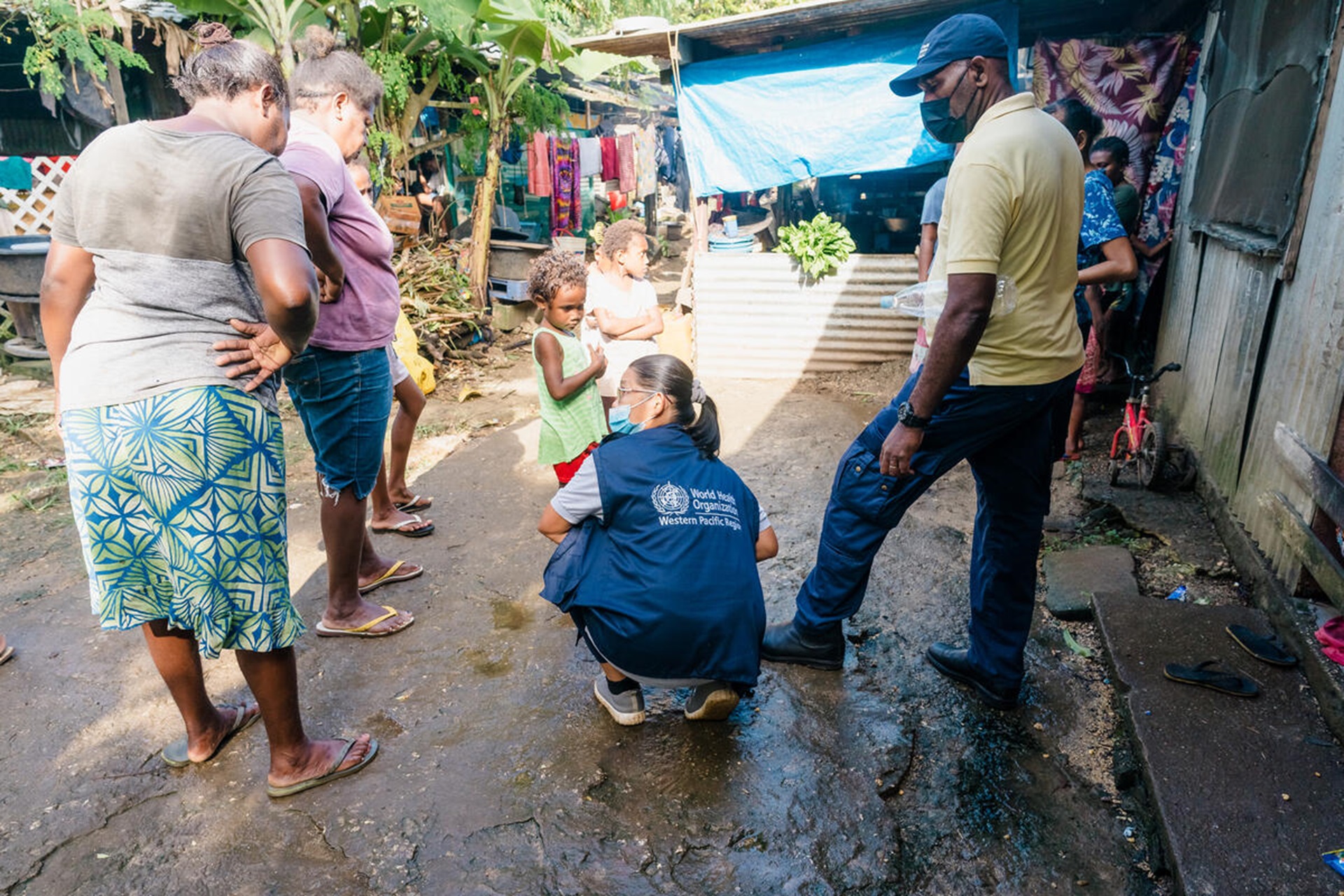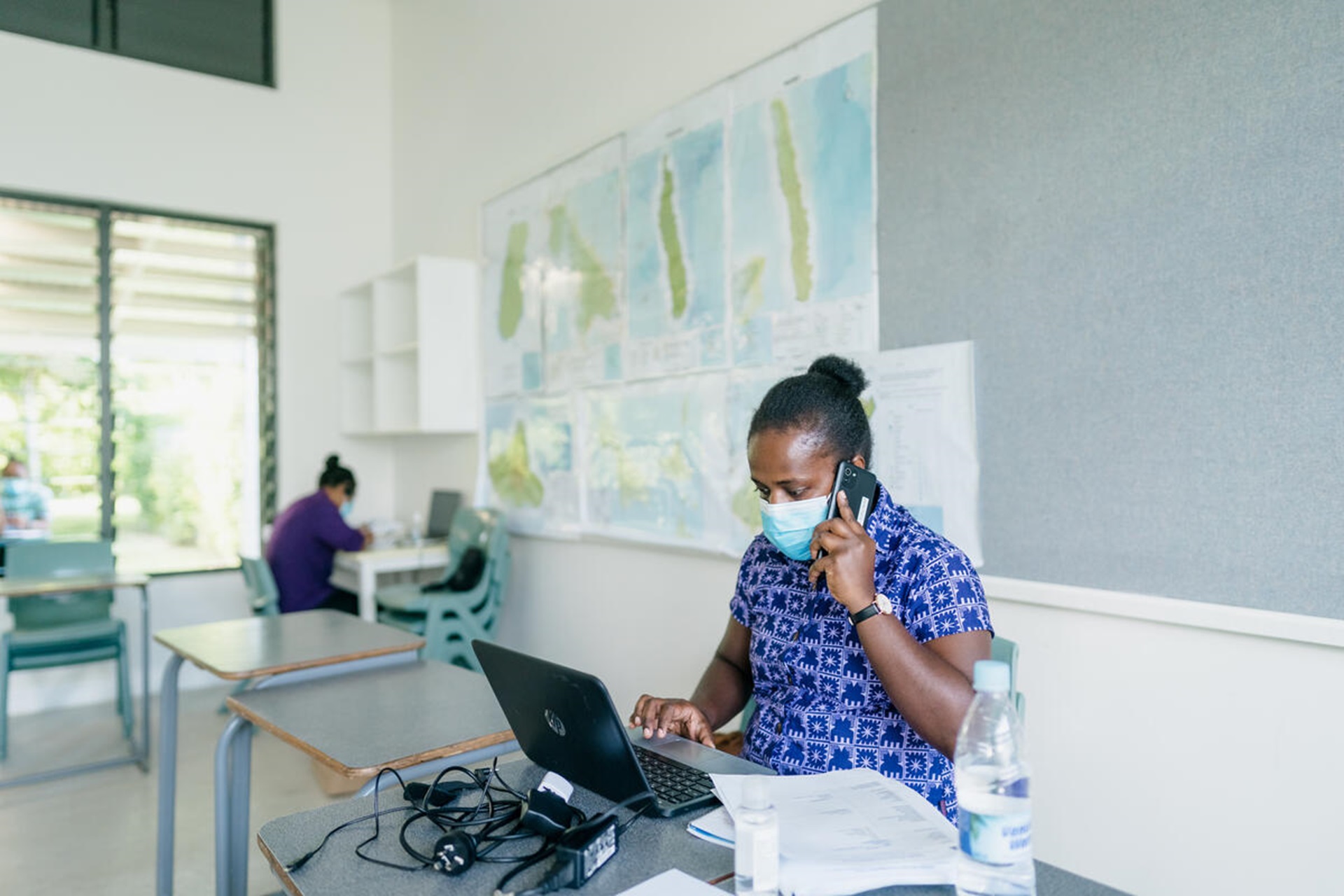Vanuatu’s islands are known for their rich cultural heritage, but beneath this beauty lies a pressing challenge: the country faces persistent public health threats, exacerbated by limited infrastructure, frequent disasters, and the growing impact of climate change. As one of the most disaster-prone countries in the world, Vanuatu is highly vulnerable to disease outbreaks, which can quickly overwhelm its health-care system.
Disasters can disrupt access to clean water, sanitation, and health care, while displacement, overcrowding, and interruptions to routine services like vaccination and surveillance further increase the risk of disease spread, especially in a context where health systems are already strained.
In response, the Ministry of Health has been enhancing its public health capabilities through digital innovation. As outlined in the Vanuatu Digital Health Strategy 2025–30, the country is prioritizing sustainable, data-driven health systems that are agile and responsive to threats.
A key part of this strategy is Go.Data, a critical platform in the country's surveillance toolkit. Go.Data is a digital tool that supports case investigation and contact tracing through real-time data entry, even in low-connectivity settings, with integrated datasets, analytics, and features to organize and monitor field operations.
Originally adopted for the COVID-19 response, Go.Data is now expanding its role, with planned integrations to support climate-sensitive disease surveillance and AI-driven forecasting.
Go.Data: a vital tool for outbreak response
Go.Data, a tool developed by WHO in collaboration with Global Outbreak Alert and Response Network (GOARN) partners, was introduced in Vanuatu in early 2022. Its initial purpose was to support the COVID-19 pandemic response by enhancing case investigation, contact tracing, and data management. However, once Go.Data proved its value, the Ministry of Health expanded its use to manage other outbreaks, including measles, leptospirosis, tuberculosis, and yaws.
Before Go.Data, disease surveillance in Vanuatu was a more fragmented and labour-intensive process. Health workers, especially those in remote areas, struggled to manage data whilst coordinating outbreak investigations. Without reliable internet access or the ability to digitize field investigations, responses can be delayed, with health workers relying on phone calls, paper notes, and ad hoc spreadsheets to track disease spread. This made it difficult to quickly respond to outbreaks.
With Go.Data – a flexible, offline-capable platform designed to address these very challenges – health workers can now digitize data in real-time, even in areas with no internet connectivity. Its integration with the Ministry’s core health information system has helped streamline reporting functions, making outbreak intelligence an integral part of Vanuatu’s national health surveillance and reporting infrastructure.
"By working with the Ministry of Health and our global partners, we’re not just addressing today’s health challenges, we’re building a resilient, innovative future for Vanuatu. This collaboration ensures that Vanuatu’s health system is ready to face whatever comes next, with the strength and support of a united global community," said Dr Revite Kirition, Liaison Officer, WHO Country office, Vanuatu.
 Vanuatu Neglected Tropical Diseases (NTDs) awareness program on NTDs including Yaws, testing and treatment distribution in rural communities @WHO / Valerie Fernandez
Vanuatu Neglected Tropical Diseases (NTDs) awareness program on NTDs including Yaws, testing and treatment distribution in rural communities @WHO / Valerie Fernandez
Expanding Go.Data’s role in climate and AI-driven disease forecasting
The future of Vanuatu’s health surveillance system lies in the integration of innovative technologies, particularly in climate-sensitive disease surveillance and AI-driven disease forecasting. Climate change is already contributing to shifts in disease patterns across the region, with new and emerging threats driven by changing weather patterns, increased flooding, and more frequent natural disasters.
In response to this, the Ministry of Health plans to expand Go.Data’s role in forecasting disease outbreaks, not just monitoring current ones, based on climate data. The tool’s integration with the National Laboratory Information System and the refinement of standard operating procedures for multi-disease outbreak response are key initiatives in this effort. These integrations will enable health officials to predict and monitor disease trends with greater precision, allowing them to act before an outbreak reaches a crisis point.
"The Ministry of Health has always understood that to secure the future of our people, we must be ahead of the curve. With Go.Data, we are not just responding to today's challenges – we are proactively shaping the future of public health in Vanuatu. By recognizing the emerging trends and embracing the best tools for our country, we are ensuring that our health system is not only resilient but ready to meet the evolving needs of our communities. This is about making decisions today that will safeguard the health and well-being of future generations" said Rachel Takoar, Digital Health Manager at the Ministry of Health.
The future of Vanuatu’s digital health system also lies in its adoption of AI-powered models for disease forecasting. By combining data from Go.Data, the existing health information system, and climate models, Vanuatu aims to develop predictive tools that can forecast disease trends based on factors such as temperature, humidity, and rainfall.
 COVID-19 response in Vanuatu Staff support contact tracing efforts during Vanuatu's first COVID-19 outbreak in April 2022 @WHO / Valerie Fernandez
COVID-19 response in Vanuatu Staff support contact tracing efforts during Vanuatu's first COVID-19 outbreak in April 2022 @WHO / Valerie Fernandez
A model for other island nations
Vanuatu’s journey with Go.Data shows how digital health tools can revolutionize public health systems in small island nations. By leveraging technology, Vanuatu has improved its ability to respond to outbreaks, protect its communities, and build a more resilient public health infrastructure.
"Vanuatu is offering an emerging model for integrating health and climate data. The integration of Go.Data with climate data and the application of AI for predictive disease forecasting is setting a bold precedent for the Pacific. While still evolving, this work reflects a promising direction: anticipating threats before they manifest and taking action before they escalate. Efforts like these show that, with appropriate tools and partnerships, island nations can strengthen their resilience to the intersecting challenges of climate and health," said Silvia E. Morreale, Go.Data focal point at the GOARN Operational Support Team.
As other countries in the Pacific region and beyond face similar challenges, Vanuatu’s experience with Go.Data offers a blueprint for harnessing the power of data, digital tools, and innovative technologies to build health systems that can withstand the pressures of climate change, natural disasters, and emerging health threats.
